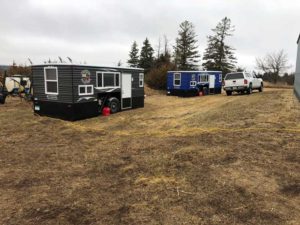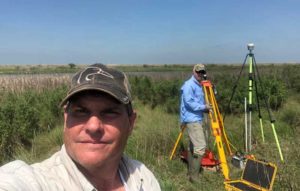As they’ve done each morning since late March, longtime friends Les Morgenstern and Brad Karel wake up in their camper trailers in southwest Minnesota, cook breakfast on a stove and get ready for their day.
Morgenstern and Karel aren’t leisurely recreating. Their campsite at Talcot Lake Wildlife Management Area is their new, temporary base of operations and a creative solution for executing vital engineering work on Ducks Unlimited conservation projects during the COVID-19 pandemic.
“This traditionally is the season we do most of our project mapping and topographical survey work, and this way we’re not subjecting ourselves to the hotel rooms and the risk,” said Karel, manager of conservation services for DU’s Great Lakes/Atlantic Region.
What makes Ducks Unlimited unique among conservation organizations is its ability to deliver large-scale, on-the-ground habitat restoration across the country. DU averages more than 250,000 acres of wetlands enhancement, improvements or protection annually, and has conserved more than 14.5 million acres across North America since 1937.
Achieving that success takes year-round planning. A disruption in any part of that work cycle has a domino effect on both restoration and conservation projects, which could harm efforts to improve waterfowl habitat and water quality. The current global pandemic has forced DU’s staff to take extra precautions to keep projects on schedule.
“We are staying engaged as much as we can considering the circumstances,” said Bruce Toay, conservation programs manager for South Dakota.
“As we roll into spring and early summer, local landowners are still operating as normal. Crops are going in the ground. We are still working with ag producers to improve their management practices that are beneficial to their livelihoods, for wetlands and waterfowl habitat,” Toay said.
Staff are following guidelines from the U.S. Centers for Disease Control. Most are working from home and video conferencing like most of America. But you can’t physically rebuild a 1,000-acre wetland or prairie from a kitchen table.
Michael Baker, director of engineering for DU’s Great Lakes/Atlantic Region, said DU is making sure staff remain safe on the landscape.
“Nobody has to go out if they don’t want to or aren’t comfortable doing it. We put health and safety above everything else,” Baker said. “But there’s a big desire by field staff to keep things moving. Everybody is approaching it very reasonably and thinking of the greater good.”
Keith Wesley is DU’s senior engineering technician for Oklahoma, New Mexico and Texas. He and his partner, Engineering Technician Jacob Cormier, plan ahead to avoid people and virus exposure.
“We’ve taken home all of our equipment and don’t even go into the office. We go right from home to the job site,” Wesley said.
Wesley and Cormier stick to day trips to avoid hotels. Since DU field staff cover large areas, those day trips easily stretch to 14 hours or longer. But they know what happens if they don’t get to their site.
“If I can’t get stakes in the ground, our contractors are going to struggle to build our project,” he said. “If I’m not there, I can’t check the project and tell them they are good.”
Morgenstern and Karel have several projects 450 miles from their house, so day trips aren’t practical. They normally live in hotels during April while they survey. Sticking to their northern state roots, they leased a pair of mobile ice fishing house campers that were just pulled off frozen lakes for the season.
Strong partnerships with other organizations also make new challenges easy to conquer.
“We are able to do what we do because of the Minnesota Department of Natural Resources, which provided us with a special use permit to park these trailers where they are,” Morgenstern said. “This really fit as an alternative, so here we are. It is a team effort, we’re just one piece of the solution.”
Photos courtesy of Ducks Unlimited.



